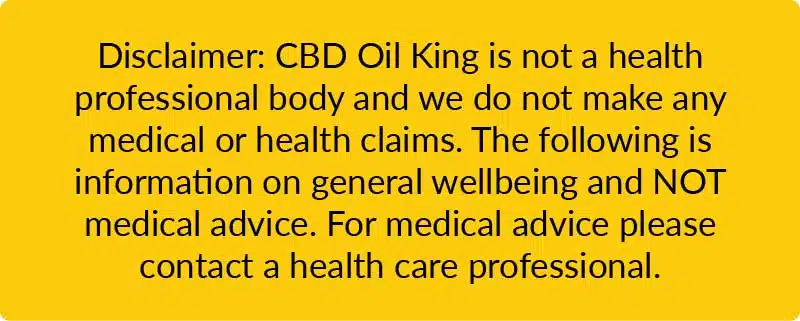 Shop Our CBD Range
Shop Our CBD Range
Do you find yourself worrying more than usual? Do you ever feel like the world is just too much to handle, or that you're always on edge? If so, then it could be possible that you are experiencing symptoms of anxiety. Anxiety is a mental health disorder that can present in multiple forms and severity levels - from mild panic attacks to paralysing phobias. In this blog post, we'll take a look at the different types of anxiety-related disorders and identify some common signs as well as coping strategies for managing them.
Anxiety is a natural emotion that everyone experiences to some degree, but when it arises on an intense and frequent basis, it can become an unhealthy mental health condition. Anxiety manifests itself differently in individuals, causing physical symptoms such as jitteriness and faster heartbeats as well as psychological distress like persistent worrying and difficulty concentrating. Some people may suffer from social anxiety disorder which can lead to fear of meeting new people or attending group activities due to fear of embarrassment or judgement. Others may experience Generalised Anxiety Disorder (GAD) where there is a sense of worry about everyday situations even when there is no real danger, leading to sleep disturbances and becoming easily overwhelmed with tasks. No matter what type of anxiety someone experiences, it’s important to remember that help is available through therapy, counselling, and other treatments tailored for the specific type of disorder.
Panic attacks are an incredibly frightening and overwhelming experience that can take hold of a person in unexpected moments. A person experiencing a panic attack may feel suddenly gripped by intense fear or terror, even when no direct threat is present, and can manifest as various physiological, emotional, and cognitive symptoms such as tightness in the chest, difficulty breathing, nausea, rapid heartbeat, shaking or trembling, dizziness and nausea. Although the episode is fleeting and often dissipates within minutes of onset, understanding the common signs associated with panic attacks allow individuals to quickly recognize them in themselves and get adequate help before the panic escalates. Seeking out the available pathways to help such as therapy can be crucial to those struggling with recurrent panic attacks.
Exploring the causes of phobias, understanding triggers, and considering treatment options can all be beneficial for anyone who struggles with this unfortunately common mental affliction. Depending on the specific type of phobia, the root cause may vary; for some situations, previous negative experiences or a particularly stressful situation may have served as an initial trigger. Other times a traumatic event that left a lasting emotional mark could also be at the core of a particular phobia. While in some scenarios, it can be difficult to find out exactly why certain fears developed, seeking professional help from mental health experts can provide insight into tackling them. With successful treatment paths like therapy, exposure therapy, hypnosis, and other methods available today, facing and overcoming anxieties is more achievable than ever before.
Social Anxiety Disorder (SAD) is a condition characterised by overwhelming fear and apprehension in social settings. Sufferers often experience physical symptoms such as nausea, profuse sweating, or increased heart rate. These anxious reactions can result from activities that involve conversing or performing in groups, meeting new people, attending parties, or public speaking. Though it might feel like there is no end to the suffering associated with SAD, there are numerous coping strategies available. Therapy sessions can help an individual identify behaviours that cause anxiety, so they can develop new coping mechanisms. Medication can be used to treat SAD in conjunction with therapy. Meditation and mindful breathing exercises have also been successful at relieving feelings of panic and stress. With the right combination of strategies tailored to suit each individual's needs and lifestyle, recovery from Social Anxiety Disorder is possible.
Generalised Anxiety Disorder can be a debilitating condition which is characterised by feelings of fear and unease, accompanied by physical symptoms such as muscle tension or nausea. Common signs to look out for include difficulty concentrating or sleeping, restlessness, being easily startled, feeling constantly on edge, and/or worrying incessantly about small to large matters. If any combination of these signs are present for a prolonged period of time it may be time to seek help from a medical professional. Treatment options traditionally used in the management of GAD involve either psychotherapy - such as Cognitive Behavioural Therapy - or medication prescribed by your doctor. Although GAD can affect those who suffer from it severely, help is available and many people have gone on to find relief with the right treatment plan tailored specifically to their needs.
Cannabidiol (CBD) is making waves in the health world for its potential positive impact. While studies are still in the early stages, there is evidence that CBD could be a game changer for millions of people. People who took on anxiety pens with CBD do so to feel calmer and more relaxed, as well as adding an extra spring into their steps during the day.
People tend to use CBD Vape more for anxiety relief. This is primarily becuase vaping CBD helps to deliver CBD quickly in the blood stream, also this can be reused discreetly throughout the day.
While there is not yet much definitive information on correct dosing or whether CBD works on anxiety, a growing number of people are turning to CBD oil to help manage their health and wellbeing. It's worth doing your research and trying CBD.
Please note that CBD is not the same as THC. THC is illegal in UK, even though a lot of people are looking for THC vape or Vape liquid with THC additive as a way of achieveing calm. The nature of THC means that it will make you jittery NOT calm. under UK law THC is capped ay 1mg per container and hence only places where you can find a little THC legally is a THC Vape pen containing full spectrum CBD Oil.


This article is authored by Dr Casey Abrahamsmen. Dr Abrahamsmen is a board certified physician with over 13 years of experience in internal medicine and pain management. He practises Palliative care at a hospital in Venezuela and is a strong advocative for CBD and believes CBD has a major role to play towards healthy non addictive pain management habits. You can read more about Dr Abrahamsmen here.
This article was peer-reviewed by Dr M Mansoor Siddique (PhD). Dr Siddique has over eight years of experience working with CBD and CBD products.
Disclaimer: All of our products are not intended to diagnose, treat or cure any disease. It is recommended to check with doctor before starting a new dietary supplement program. All CBD products sold have less than 0.2% THC content and abide by both EU an UK law.